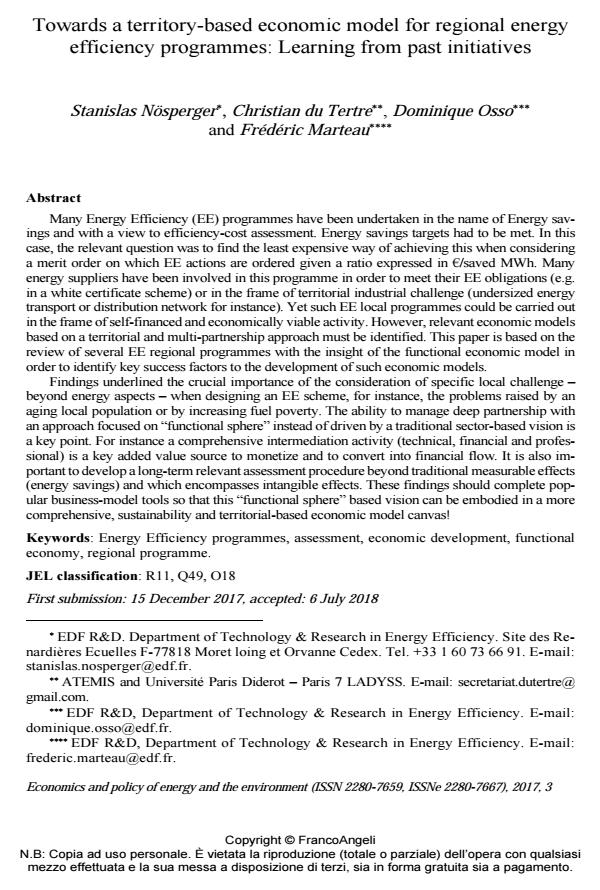Towards a territory-based economic model for regional energy efficiency programmes: Learning from past initiatives
Titolo Rivista ECONOMICS AND POLICY OF ENERGY AND THE ENVIRONMENT
Autori/Curatori Stanislas Nösperger, Christian du Tertre, Dominique Osso, Frédéric Marteau
Anno di pubblicazione 2018 Fascicolo 2017/3
Lingua Inglese Numero pagine 21 P. 95-115 Dimensione file 348 KB
DOI 10.3280/EFE2017-003006
Il DOI è il codice a barre della proprietà intellettuale: per saperne di più
clicca qui
Qui sotto puoi vedere in anteprima la prima pagina di questo articolo.
Se questo articolo ti interessa, lo puoi acquistare (e scaricare in formato pdf) seguendo le facili indicazioni per acquistare il download credit. Acquista Download Credits per scaricare questo Articolo in formato PDF

FrancoAngeli è membro della Publishers International Linking Association, Inc (PILA), associazione indipendente e non profit per facilitare (attraverso i servizi tecnologici implementati da CrossRef.org) l’accesso degli studiosi ai contenuti digitali nelle pubblicazioni professionali e scientifiche.
Many Energy Efficiency (EE) programmes have been undertaken in the name of Energy savings and with a view to efficiency-cost assessment. Energy savings targets had to be met. In this case, the relevant question was to find the least expensive way of achieving this when considering a merit order on which EE actions are ordered given a ratio expressed in €/saved MWh. Many energy suppliers have been involved in this programme in order to meet their EE obligations (e.g. in a white certificate scheme) or in the frame of territorial industrial challenge (undersized energy transport or distribution network for instance). Yet such EE local programmes could be carried out in the frame of self-financed and economically viable activity. However, relevant economic models based on a territorial and multi-partnership approach must be identified. This paper is based on the review of several EE regional programmes with the insight of the functional economic model in order to identify key success factors to the development of such economic models. Findings underlined the crucial importance of the consideration of specific local challenge - beyond energy aspects - when designing an EE scheme, for instance, the problems raised by an aging local population or by increasing fuel poverty. The ability to manage deep partnership with an approach focused on "functional sphere" instead of driven by a traditional sector-based vision is a key point. For instance a comprehensive intermediation activity (technical, financial and professional) is a key added value source to monetize and to convert into financial flow. It is also important to develop a long-term relevant assessment procedure beyond traditional measurable effects (energy savings) and which encompasses intangible effects. These findings should complete popular business-model tools so that this "functional sphere" based vision can be embodied in a more comprehensive, sustainability and territorial-based economic model canvas!
Parole chiave:Energy Efficiency programmes, assessment, economic development, functional economy, regional programme.
Jel codes:R11, Q49, O18
Stanislas Nösperger, Christian du Tertre, Dominique Osso, Frédéric Marteau, Towards a territory-based economic model for regional energy efficiency programmes: Learning from past initiatives in "ECONOMICS AND POLICY OF ENERGY AND THE ENVIRONMENT" 3/2017, pp 95-115, DOI: 10.3280/EFE2017-003006